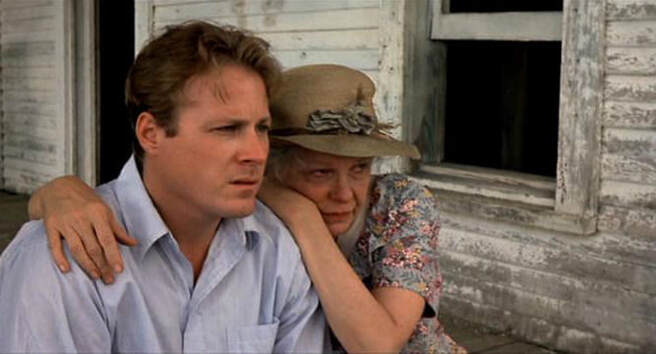In case you haven’t caught it yet, here’s the story line:
Living in 1940s Houston with her son and daughter-in-law, 70-something Carrie Watts (Geraldine Page) has just one wish to fulfill before she dies: visiting her childhood home in a town called Bountiful. Son Ludie (John Heard) is too busy trying to make a living for them to take her there himself, and his wife Jessie Mae (Carlin Glynn) is too busy pursuing her own little pleasures to care. So Mrs. Watts takes the matter into her own hands, escaping by Greyhound bus to the closest stop. It’s 10 p.m. when they arrive, and pitch black outside. She decides to sleep on a bench in the nearly empty bus station, and then to walk the last 12 miles to Bountiful in the morning.
Alas, she’s found out, and the local sheriff is under orders to hold her until Ludie can get there to pick her up.
While they wait, the kind-hearted sheriff decides to take Mrs. Watts to Bountiful. There’s not much left – just a few abandoned structures. Her childhood home, too, is a ruin, but the sheriff settles her on an upturned crate at the crumbling front porch and talks with her gently for a few minutes before leaving her alone with her memories. We walk through the house with her, knowing that she sees more than we do, so much more than this empty shell of a home. And she is in fact restored by the visit. She returns to Houston with her son and daughter-in-law, peacefully and finally at peace.
This was just the second time I’d seen this movie as a Christian, and oh, what a difference a worldview makes! Mrs. Watts is clearly a believer. Hymns are the sound track of her life, and she turns to her battered Bible throughout her journey. She knows her time on earth is limited, but doesn’t seem to be disturbed in the least by her mortality; she knows that she will spend forever in heaven with her Savior.
I remember weeping inconsolably over this movie in the past. But not now; I may shed a few tears, but they are tears of joy and longing for eternity, not of despair or bitterness.
There are two things that really strike me about “Bountiful” now that I'm a believer.
First, there’s what the movie reveals about our relationship to time as we age.
We see that Mrs. Watts has little thought of the present, or of her remaining time in this world. Instead, she has an all-consuming longing to revisit her distant past, perhaps as a touchstone on her way to eternity.
We see that daughter-in-law Jessie Mae, on the other hand, has no thought of anything but today, of her present comfort and pleasures. Sadly, I can identify with such shallowness; she reminds me of myself before I encountered the living God.
And then we see son Ludie, stuck somewhere in between. While he’s sympathetic to his mother’s memories, he refuses to join her on this sentimental journey of hers. He has focused his heart and mind on today, because thinking of the past is painful.
“I should have made myself bring you out here sooner,” he says when he finally catches up with her at the old house. “I’m sorry. I just thought it’d be easier, if we didn’t see the house again.”
Then, rejecting her invitation to look around: “I don’t see any use in it. I’d rather remember it like it was.” Except we know that people who say such things go to great lengths to forget, burying their memories beneath an avalanche of activity and entertainment. We know that Ludie is like this, that he keeps a tight leash on his memories.
A bit later, as he reflects on his failure to make a good life for his wife and mother, Ludie admits it. “Mamma, I lied to you,” he says. “I do remember – I remember so much. This house, this life here, the night you woke me up and dressed me and took me for a walk when the moon was full and I cried ‘cause I was scared and you comforted me.
“Mamma, I want to stop remembering. It doesn’t do any good, remembering.”
And in a way, he’s right. Nothing on this earth can compete with the memory of past joy. Only the promise of eternal joy can eclipse it.
The second thing that struck me about my latest viewing of “The Trip to Bountiful” is related: Perhaps the second-best thing we can do for the elderly is to help them go home again, if only in their thoughts.
I’ve done this somewhat instinctively in my nursing-home visits, I suppose, but selfishly; I love hearing about life in the pre-WWII U.S., and seeing pictures from that era, and learning about the people who were dear to my aging friends. It never occurred to me that they might get even more pleasure than I do out of talking about these things.
But thanks to this phenomenal movie and wonderful performances by Geraldine Page and John Heard, I can see that it would be so. From now on, I’ll make a point of helping them focus on the good ol’ days instead of wasting words on the bad ol’ here and now -- after, of course, sharing the best gift of all with them, which is the gospel of Jesus Christ.
In the meantime, I may just go back and visit Bountiful once more. If you’d like to see it, for the first time or the tenth, look for it on youtube.

 RSS Feed
RSS Feed